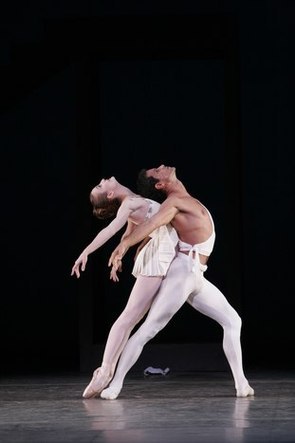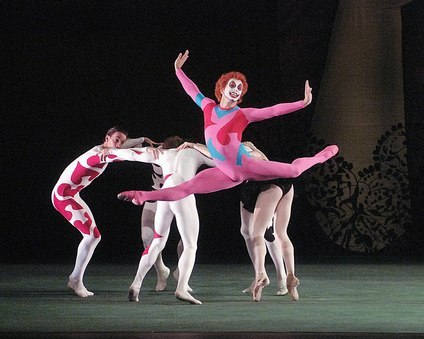|
 |
|
|
 |
 |
Apollo (1943): ( See October 25, 2005 Review). Choreography by George Balanchine, Staged by Richard Tanner, Music by Igor Stravinsky, Original Lighting by Ronald Bates, Lighting Re-Created by Brad Fields. "Apollo" was first performed by Ballets Russes in 1928 in Paris and by ABT in 1943 in New York City at the Met Opera House. (Program Notes). May 30: Conductor: Ormsby Wilkins, Performed by Jose Manuel Carreño as Apollo, Julie Kent as Terpsichore, Gillian Murphy as Polyhymnia, Maria Riccetto as Calliope, Jennifer Alexander as Leto, mother of Apollo, and Adrienne Schulte and Hee Seo as Handmaidens. May 31: Conductor: Ormsby Wilkins, Performed by Carlos Acosta as Apollo, Paloma Herrera as Terpsichore, Michele Wiles as Polyhymnia, Maria Riccetto as Calliope, Jennifer Alexander as Leto, mother of Apollo, and Adrienne Schulte and Hee Seo as Handmaidens Between the two casts for this renowned and recently presented Stravinsky-Balanchine collaboration, I found Carreño to be unusually restrained, tightly wound. Carlos Acosta, as Apollo, performed with his signature physicality, presence, and poignancy. However, on May 30, Julie Kent and Gillian Murphy seemed to be more magnetic and memorable in their interpretations of Terpsichore and Polyhymnia than Paloma Herrera and Michele Wiles, both of whom were a bit upstaged by Carlos Acosta. In the role of Calliope, Maria Riccetto performed both nights, and her theatrics and dance were stunning. Somehow, ABT's Apollo seems more convincing on the smaller, City Center stage. Yet, this requisite work is a riveting opening to this All Star Stravinsky program. Jeu de Cartes (A Poker Game in Three Deals) (2006): Choreography by John Cranko, Staged by Jane Bourne, Music by Igor Stravinsky, Scenery and Costumes by Dorothee Zippel, Lighting by Brad Fields. May 30: Conductor: David LaMarche, Performed by Carlos Lopez as Joker, First Deal - Irina Dvorovenko as Queen of Hearts, Second Deal - Julio Bragado-Young, Aaron Scott, Grant DeLong, Jared Matthews, and Gennadi Saveliev, as Hearts Flush, Third Deal - Sarah Lane as Two of Diamonds, and the Company as First Deal - Two Tens, Two Sevens, Third Deal - Ten of Spades, Jack of Spades, King of Spades, Ace of Spades, and Cards. May 31: Conductor: David LaMarche, Performed by Craig Salstein as Joker, First Deal - Gillian Murphy as Queen of Hearts, Second Deal - Julio Bragado-Young, Aaron Scott, Grant DeLong, Sascha Radetsky, and Gennadi Saveliev, as Hearts Flush, Third Deal - Erika Cornejo as Two of Diamonds, and the Company as First Deal - Two Tens, Two Sevens, Third Deal - Ten of Spades, Jack of Spades, King of Spades, Ace of Spades, and Cards. Jeu de Cartes, the Cranko version, staged by Jane Bourne, is a wonderful addition to the one-act repertoire. Although I䴞m rarely fond of campy pantomime in ballet, this work is a definitive exception. The star of the event is the Joker, and, of the two casts, Craig Salstein was clearly the more entertaining, with a very gay walk and a highly prominent wiggle. He did not move out of character, even at curtain calls. Carlos Lopez was also in character, but seemed to under-act in this pink, curly-wigged role. The Hearts Flush men, almost the same cast on both nights, were the next choreographic highlight, and their dynamic dance in heart-strewn unitards was hilarious. Gillian Murphy seemed more engaging as Queen of Hearts, although Irina Dvorovenko created vaudevillian mime, and both Sarah Lane and Erica Cornejo, as Two of Diamonds, danced with pizzazz. Dorothee Zippel's scenery and costumes are worthy of an award for scintillating, colorful motifs of hearts, diamonds, clubs, and spades. Kudos to John Cranko and Jane Bourne. Petrouchka (1911): ( See June 22, 2005 Review). Choreography by Michel Fokine, Music by Igor Stravinsky, Staged by Gary Chryst, Sets and Costumes by Alexandre Benois, Lighting by Natasha Katz. Petrouchka was la crème of Ballet Russes, a collaboration of Fokine, Stravinsky, and Benois. The four scenes tell a story of a Charlatan in a Carnival celebration in St. Petersburg, who has three puppets, a ballerina, a rich Moor, and the sad clown, Petrouchka. These three puppets alternately are loved, despised, or killed, resulting in a surreal, final scene. (ABT Notes).May 30: Conductor: Ormsby Wilkins, Performed by Xiomara Reyes as The Ballerina, Julio Bocca as Petrouchka, Isaac Stappas as The Moor, Gary Chryst as The Charlatan, Veronica Part as The Chief Nursemaid, Roman Zhurbin as The Chief Coachman, Craig Salstein and Aaron Scott as Grooms, Kirk Peterson as The Spirited Merchant, Stella Abrera and Sasha Dmochowski as Gypsies, Jesus Pastor as The Devil, Misty Copeland and Anna Liceica as Street Dancers, and The Company as The Nursemaids, Coachmen, Drunkards, and Celebrants at the Fair. May 31: Conductor: Charles Barker, Performed by Stella Abrera as The Ballerina, Herman Cornejo as Petrouchka, Marcelo Gomes as The Moor, Frederic Franklin as The Charlatan, Veronica Part as The Chief Nursemaid, Jared Matthews as The Chief Coachman, Luis Ribagorda and Aaron Scott as Grooms, Clinton Luckett as The Spirited Merchant, Carmen Corella and Sasha Dmochowski as Gypsies, Carlos Lopez as The Devil, Renata Pavam and Adrienne Schulte as Street Dancers, and The Company as The Nursemaids, Coachmen, Drunkards, and Celebrants at the Fair. Petrouchka is a staple in Stravinsky repertoire, and ABT presented it last year. Julio Bocca seemed extraordinarily sad in this role (He retires from ABT in two weeks). Herman Cornejo exuded more personality and passion, like the jumping jack in a child䴞s toy. Petrouchka is a battered and bruised, rejected and ramshackle clown, a puppet and prisoner at once. Bocca demonstrated depth and nuance, while Cornejo demonstrated desire and drama. Both Xiomara Reyes and Stella Abrera were appropriately shallow, cold ballerinas, oblivious to Petrouchka䴞s devotion. In the Moor, there was much contrast, with Marcelo Gomes the wild predator, and Isaac Stappas the calculating "prison" guard. Frederic Franklin, 92, deserves all the kudos for still performing in full form, here as the Charlatan, bearded and bristling. Gary Chryst was also persuasive in the role. Jesus Pastor and Carlos Lopez were fierce, frightening devils, and the Company was splendid in all the remaining roles. Alexandre Benois䴞 costumes and sets, with a moving carousel, circus tents and rooftops, screens with scary creatures, and even a dancing bear, are signature surreal and very, early 1900's Russia. Kudos to Michel Fokine.
 Carlos Acosta in Apollo Photo © & courtesy of Rosalie O'Connor |
|
 Julie Kent and Jose Manuel Carreño in Apollo. Photo © & courtesy of Marty Sohl |
|
 Carlos Lopez in Jeu de Cartes. Photo © & courtesy of Gene Schiavone |
|
 Julio Bocca in Petrouchka. Photo © & courtesy of MIRA |
|
|
|






